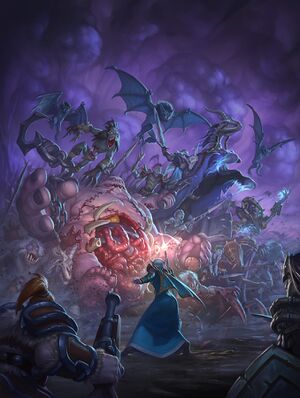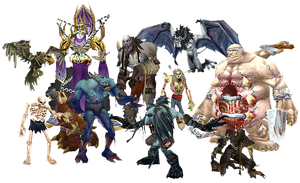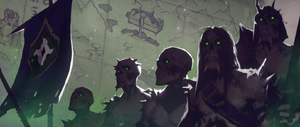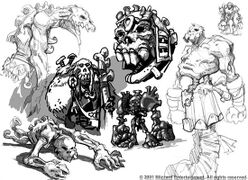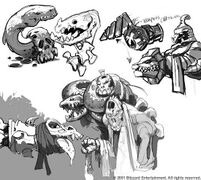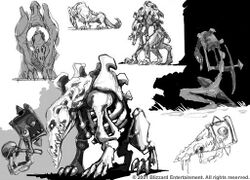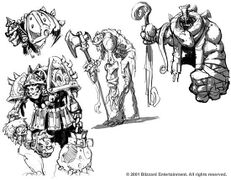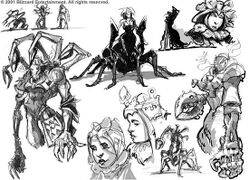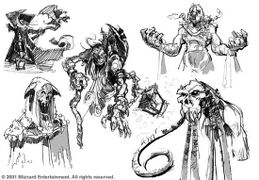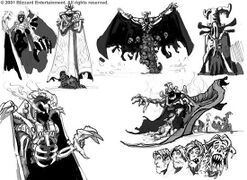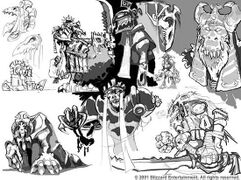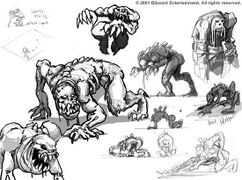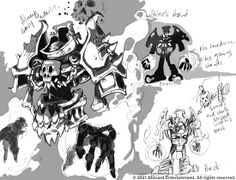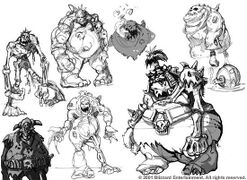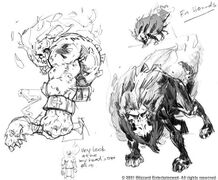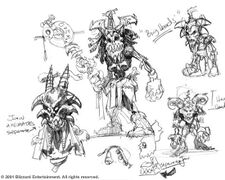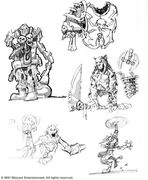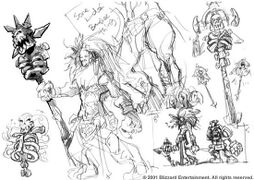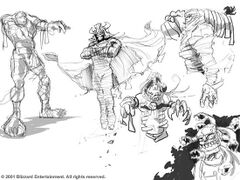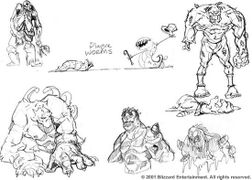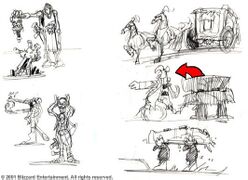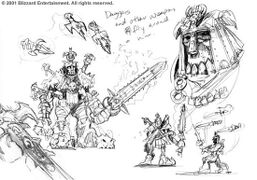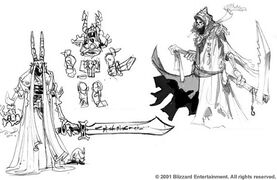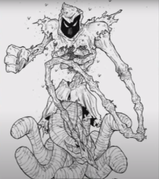Undead
- This article is about the living dead in general. For the undead Forsaken playable race, see Undead (playable). For the two main undead factions, see Forsaken and Scourge.
The undead are former mortals who have died and whose souls are trapped between life and death. These tragic beings derive power from the necromantic energies that pervade the universe. Most undead are driven by vengeance and hatred to destroy the one thing that they can never have again: life.[1] Most common examples being zombies or ghosts, undead are typically mindless, bloodthirsty fiends hostile toward any living thing that comes across their path. But some have managed to retain their memories and be who they were in life.
In the Shadowlands, they are all soldiers of the Necrolord Covenant, the armies that serve as the first line of defense in the realm of Death, and that honor those who seek power and glory in battle.
Background
Necromancy and the creation of undead soldiers were invented by the Primus and the necrolords of Maldraxxus who use the undead as a militia force in defense of the Shadowlands, should it come under attack.[2] All of them receive a portion of the Primus' power in order to carry out their duty.[3]
Undead have appeared all throughout Azeroth, they were used as a combat tool by the nathrezim during the War of the Ancients, and once again during First War when the necrolytes of the Orcish Horde animated skeletal warriors to fight against the humans. During the Second War, the essence of those necrolytes was used to power the Horde's death knights during their creation. Later, the studies of necromancy took an important role and were used heavily in the Third War when the Cult of the Damned spread the plague across Lordaeron, reanimating the majority of the dead denizens under the control of the Lich King. In modern times, the main groups of undead are the Scourge, the Forsaken, and the Knights of the Ebon Blade.
Racial history
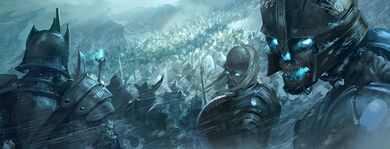
Maldraxxi
In Maldraxxus, birthplace of necromantic magic,[4] the undead Maldraxxi are unified under an Eternal One known as the Primus. They are split into five houses that pledged unending loyalty to the Primus, the House of the Chosen, the House of Constructs, the House of Eyes, the House of Rituals and the House of Plagues; each with their own specialties to protect the Shadowlands. The purpose of the House of Constructs is the creation of necrotic constructs to populate Maldraxxus's armies. Among their ranks, the house employs many Maldraxxi necromancers to insert Maldraxxian souls in the bodies they created,[5] or alternatively, to separate body and soul from already existing constructions.[6]
Forsaken
A great portion of the human denizens of the kingdom of Lordaeron was resurrected by the plague propagated by the Cult of the Damned. First under the Lich King influence, they managed to get free thanks to Sylvanas Windrunner and the weakening of the Lich King in Northrend. Following the Plaguelands civil war, the undead survivors proclaimed themselves as the Forsaken, with Sylvanas Windrunner as their Queen, and vowed to defeat the Scourge and ultimately the Lich King himself.
Free will is one of the cornerstones of Forsaken culture, with the great capacity for both good and evil that it entails. However, some undead, especially those who die in combat or under extreme stress and are raised soon after, enter into a violent, frenzied state. Undead in this state are easily manipulated and their rage is often directed at the foes of those who raised them. After the effects wear off, if the risen corpse has not been destroyed, they are given the same ultimatum that other Forsaken are offered: join the Dark Lady or return to the grave.[7] Each Forsaken member follows their queen for various reasons: fear, loyalty, and nowhere else to go.[8]
Darkfallen
When the death knight Arthas Menethil invaded Quel'Thalas, he raised the fallen members of Sylvanas Windrunner's army either as incorporeal banshee or as intact bodies. These fallen high elves would become known as Darkfallen, prowling the lands as either dark rangers or blood mages for the Scourge.[9] The San'layn are a sect of vampiric Darkfallen in service to the Scourge.[10] They are known for their guile and dark magic, particularly the manipulation of blood and shadow magic.[11] They used to be among Prince Kael'thas Sunstrider's greatest followers,[12] until they were raised into undeath by Arthas following Illidan Stormrage's failed assault on the Frozen Throne.[13]
Biology
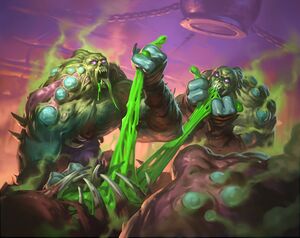
There are many different kinds of undead, but they have some common traits, such as deteriorating skin or generally unkempt hair.
Incorporeal undead are composed of a substance called ectoplasm, which can have different consistencies depending on climate.[14] Powerful undead are sometimes so infused with evil that it coalesces into a greenish goo known as the ichor of undeath.[15] Some undead bleed this green liquid when wounded,[16] though some have no blood or liquid running through their bodies at all.[17] The majority of undead are in a mindless state, without knowing or controlling their bodies but if the body is kept intact, they could potentially avoid this altogether and live forever.[18] The undead normally do not sleep, as it is not necessary for them.[19][20] There are cases of undead sleeping, especially death knights and Forsaken, but it is seemingly only to rest their bodies. Some undead feel the need to breathe, though they can last at least a dozen days without taking a fresh breath of air,[21] depending on the type of undeath but as they are undead, they don't need air to live.[22] Undead are capable of eating, but they don't need to.[23] They can become drunk,[24][25] but they do not experience the same pleasure from alcohol as the living do,[26] and the Scourge warned its members that "Alcohol is simply not the same".[19] Some undead can smell.[27][28]
Being an undead has advantages such as dismemberment not being enough to be killed. Some can also reattach their limbs and joints,[29] or replace their body parts by harvesting and sewing on the body parts of others,[30] eat other humanoids and undead as a way to renew their strength[31][32] and drain the life force of others.[33] In order to truly kill an undead, it is necessary to burn the remains of a destroyed body. The Light is known to cause intense pain to the undead, but if used with the intention of healing, though very painful, it is effective.[34] Holy water blessed by the Light has a damaging effect on the undead.[35][36]
Nature of undeath
Great Dark Beyond
In the physical universe, the souls of the undead (Forsaken, death knights, or ghouls) are imperfectly attached to their bodies; the dark magic that sustains them is a buffer that prevents their souls from properly joining with their bodies. This is why undead feel only faint sensations of pain or discomfort from most physical stimuli, and why the Light is so painful to their existence. The primary exception to this rule are liches, as liches bind their souls to a phylactery and then use the phylactery to generate a physical form; this process is why lich bodies look nothing like their mortal bodies, and also why you have to destroy a lich's phylactery to truly kill them.[37] Undeath also strips certain parts away from every soul.[38]
Despite all this, there exists at least one account of someone becoming undead through the power of the Light: Calia Menethil.
Aside from their affliction, some undead also suffer from an addiction to terrible vices. Death knights, for example, possess an addiction to inflicting pain. If death knights do not regularly inflict agony upon another creature, they begin to suffer wracking pains that could drive them into a mindless, blood-seeking hysteria.[39] Zombies and Forsaken have a hungering for living flesh[40][41] and San'layn have been known to consume blood.[42]
Generally, most enslaved undead are tormented and restless by their subjugation. Some welcome it if it grants them the benefits of eternal life. Many undead who are sentient enough to understand their circumstances appear emotionally dispassionate if not melancholy. The most known emotions that the undead seem to emote are remorse, pity,[43] or rage.[44] Some undead, especially those who die in combat or under extreme stress and are raised soon after, enter into a violent, frenzied state. Undead in this state are easily manipulated and their rage is often directed at the foes of those who raised them.[45]
Becoming Forsaken is an unpredictable process. The body and mind are certain to change, but it is impossible to know to what extent and how well someone will cope with the process. According to Lilian Voss, everyone goes a little mad when they become Forsaken, and some more than others.[46]
Undead experience dulled senses such as touch, smell,[28] and taste. Some find that while their rotted tongues can taste very little, they've become accustomed to the textures and sensations of food instead.[47] There are reports that when influenced by the Holy Light, some Forsaken have slowly experienced a sharpening of their dulled senses, as well as an increase in the flashes of positive emotions that have otherwise become rare since their fall into undeath. The drawback, however, is that they also become disgusted with themselves and are likely to increase attempts at their own self-destruction; for regaining these senses would force the undead to smell their own rotting flesh, taste the decay in their mouths and throats, and even feel the maggots burrowing within their bodies.[28]
Some of those who freed themselves from the Lich King's grasp are tormented by memories of the unspeakable horrors that they committed as mindless Scourge agents and are driven into madness or consumed by regret, whereas others embrace their new condition and may go on to indulge in their vile vices. Others don't even remember their time as a mindless slave of the Scourge and so bear no emotional trauma from it at all.[48] Though the person might be traumatized by their experience as an undead, once released their soul will be judged by the entirety of their existence, and, as such, they might still reach a positive afterlife.[49]
Shadowlands
In Maldraxxus, the birthplace of necromantic magic, the souls of the ambitious and contentious are forged into an immortal army charged with the defense of the Shadowlands.[50] It is a place all about flesh shaping and resources given to Maldraxxi to become the best army they can. Someone arriving in Maldraxxus is given a very basic kind of form that they can inhabit and then based on their victories or their losses they get upgrades or downgrades to that body, while masters of the powers of death turn legions of ambitious souls into relentless immortal armies, and necrotic soldiers are forged by an eternity of war or are made from the bodies taken as spoils of war.[51]
Characteristics in World of Warcraft
- Cannot be skinned, except for certain undead animals that would otherwise be classified as beasts (i.e.: bears, boars, wolves, etc).
- Generally are unaffected by mind-affecting spells, like
 [Fear], sleep or mind control, however, priests can use
[Fear], sleep or mind control, however, priests can use  [Shackle Undead] to temporarily imprison monsters and paladins can use
[Shackle Undead] to temporarily imprison monsters and paladins can use  [Turn Evil] which works just like a fearing spell. This does not apply to player characters of the undead race, which are technically classified as humanoid, for purposes of game-balance.
[Turn Evil] which works just like a fearing spell. This does not apply to player characters of the undead race, which are technically classified as humanoid, for purposes of game-balance. - Can be tracked by Hunters.
- Death knights under the effect of
 [Lichborne] are considered undead.
[Lichborne] are considered undead. - Death Coil (death knight ability) can heal them, assuming they are of friendly allegiance to the death knight.
Types of undead
Corporeal
Corporeal undead are average corpses or body parts reanimated by the plague or necromancers, or are various body parts stitched together into abominations.



 Abomination
Abomination
 Crawling hand
Crawling hand Crypt fiend
Crypt fiend
- The Dead


 Death knight
Death knight Deathcharger
Deathcharger Gargoyle
Gargoyle Geist
Geist Ghoul
Ghoul Homunculus
Homunculus

 Mad scientist
Mad scientist
 Maldraxxi gladiator
Maldraxxi gladiator Maldraxxi necromancer
Maldraxxi necromancer Mur'ghoul
Mur'ghoul Plague eruptor
Plague eruptor Soul-rotted flesh
Soul-rotted flesh Undead bear
Undead bear Undead boar
Undead boar- Undead centaur[52]


 Undead draenei
Undead draenei Undead dragon
Undead dragon

 Undead dwarf
Undead dwarf


 Darkfallen
Darkfallen



 Undead human
Undead human

 Undead frost vrykul
Undead frost vrykul Undead gnoll
Undead gnoll

 Undead gnome
Undead gnome

 Undead goblin
Undead goblin


 Undead night elf
Undead night elf
 Undead orc
Undead orc
 Undead quilboar
Undead quilboar
 Undead tauren
Undead tauren
 Undead troll
Undead troll
 Undead wolf
Undead wolf
 Undead worgen
Undead worgen Vargul
Vargul Zombie
Zombie
Skeletal
Skeletal undead are skeletons animated by magic.
 Bone golem
Bone golem
 Bone wraith
Bone wraith

 Lich
Lich
 Boneguard
Boneguard- Skeleton
 Skeletal draenei
Skeletal draenei Skeletal drust
Skeletal drust Skeletal dwarf
Skeletal dwarf Skeletal giant
Skeletal giant Skeletal gnome
Skeletal gnome Skeletal goblin
Skeletal goblin
 Skeletal human
Skeletal human

 Skeletal orc
Skeletal orc Skeletal tauren
Skeletal tauren
 Skeletal troll
Skeletal troll Skeletal vrykul
Skeletal vrykul
 Slime giant
Slime giant
- Skeletal animals
- Hyena, gnoll, bear, wolf, boar, harpy[52]
 Skeletal bird of prey
Skeletal bird of prey Skeletal devilsaur
Skeletal devilsaur
 Skeletal gryphon
Skeletal gryphon Skeletal horse
Skeletal horse
 Skeletal hound
Skeletal hound Skeletal monkey
Skeletal monkey Skeletal raptor
Skeletal raptor Skeletal wind serpent
Skeletal wind serpent Slime cat
Slime cat
- Skeletal dragons:



 Frost wyrm
Frost wyrm

 Others
Others
- Miscellaneous:
 Floating skull
Floating skull Skeletal pit lord
Skeletal pit lord
Incorporeal
Incorporeal undead are ghosts and spirits of the dead.
Undead factions
| Faction | Leader | Former leader(s) | Description | Capital | Status |
|---|---|---|---|---|---|
| The Not-Living | None | A group of undead proto-dragons created after being cannibalized by Galakrond. They served as his main army against the other proto-dragons, and they were the first undead threat that Azeroth ever faced. The not-living were ultimately destroyed during the future Aspects' final battle against Galakrond. | Northrend | Destroyed | |
| The Scourge | None | Originally created by the Kil'jaeden to help usher the Burning Legion into Azeroth, it went rogue after the Battle of Mount Hyjal and waged a war to destroy all life on Azeroth. Following the fall of the Lich King, the Scourge has become passive before the destruction of the Helm of Domination. It now marauds masterless all across Azeroth. | Icecrown Citadel | Active | |
| The Forsaken | A breakaway group from the Scourge formed after they retook the Capital City of Lordaeron, they swore revenge against the Lich King and joined the Horde in an alliance of convenience. | Ruins of Lordaeron | Active | ||
| Cult of the Damned | Unknown | A cult that seeks to obtain immortality through undeath. They served the Scourge under the Lich King Arthas Menethil, and since his demise have struggled to hold their claims in the Plaguelands from encroaching Alliance, Horde, and Argent Crusade forces. They re-emerged through Azeroth following the fall of the Lich King Bolvar against Sylvanas Windrunner, answering the call of Zovaal the Jailer. | Mord'rethar | Active | |
| Rotbrain Undead | None | A breakaway group from the Forsaken, raised by the Val'kyr and united by their refusal to join Forsaken society. The group was ultimately destroyed in its infancy by Forsaken adventurers. | Rotbrain Encampment | Disbanded | |
| The Risen | None | Created by Balnazzar by killing Scarlet Crusaders and raising them into undeath with the intention of using them to conquer the Plaguelands for the Burning Legion. Ultimately they were stopped when adventurers killed their demonic leader. | Scarlet Bastion | Disbanded | |
| Knights of the Ebon Blade | An organization of renegade death knights founded Darion Mograine after they were freed from the grasp of the Lich King during the Battle for Light's Hope Chapel. They cooperated with the Argent Crusade to defeat Arthas Menethil during the Scourgewar, and since his fall, they fight as hard for the safety of Azeroth as anyone living.[53] | Acherus: The Ebon Hold | Active | ||
| Necrolord Covenant | None | A ruling faction of the Shadowlands and the inventors of necromancy. They use the souls of the strong, durable, and ambitious to create an undead militia to protect the Shadowlands. At the time of the opening of the rift between the Shadowlands and Azeroth, they had lost their leader and were approaching dangerously close to civil war, until the latter returned with the help of the Maw Walkers. | Seat of the Primus | Active |
In the RPG
Independent undead
Independent undead are undead who maintain their own free will. Not all undead from Azeroth fall under the auspices of the Scourge. Some undead resisted the command of the Lich King or his minions, while others arose through individual circumstances. Although they have no direct ties to the Scourge, such monsters are no less dangerous.[54] Despite being free of the Lich King's influence, some independent undead still choose to serve the Lich King.[55]
Notes and trivia
- The Forsaken male player character claims to be colorblind due to undeath.[56]
- For game balance, Forsaken players are classified as humanoids for gameplay reasons because, in a PvP setting, they would be massacred with
 [Exorcism],
[Exorcism],  [Holy Wrath],
[Holy Wrath],  [Turn Evil], and
[Turn Evil], and  [Shackle Undead], but they would also be immune to other CC such as
[Shackle Undead], but they would also be immune to other CC such as  [Polymorph] and
[Polymorph] and  [Fear]. Forsaken were classified as undead in the World of Warcraft beta, but it proved to be too problematic with PvP balance. Many Forsaken NPCs are also considered humanoid.
[Fear]. Forsaken were classified as undead in the World of Warcraft beta, but it proved to be too problematic with PvP balance. Many Forsaken NPCs are also considered humanoid.
Gallery
- Warcraft III concept arts
References
- ^ World of Warcraft: Chronicle Volume 1, pg. 14
- ^ worldofwarcraft.com - Shadowlands
- ^
 [60] Power of the Primus
[60] Power of the Primus
- ^
 Blizzard Entertainment. Shadowlands - Home. Retrieved on 2019-11-02.
Blizzard Entertainment. Shadowlands - Home. Retrieved on 2019-11-02.
- ^
 [53-60] Breaking Down Barriers
[53-60] Breaking Down Barriers
- ^
 [60] Skin in the Game
[60] Skin in the Game
- ^ Ask CDev - Round 3 Answers
- ^ Loreology on Twitter (dead link)
- ^ World of Warcraft: Sylvanas, pg. 184
- ^ Underdev/Icecrown Citadel: The Frozen Throne
- ^
 [60] Magus Installation
[60] Magus Installation
- ^ Ultimate Visual Guide, pg. 192
- ^ Prince Taldaram#Adventure Guide
- ^
 [60] Hunting for Ectoplasm
[60] Hunting for Ectoplasm
- ^

 [52] The Ichor of Undeath
[52] The Ichor of Undeath
- ^ File:Forsaken bleeding green.jpg A playable Forsaken character bleeding green
- ^ World of Warcraft: Traveler, pg. 96
- ^ Dave Kosak on Twitter (2012-09-30). “They're in a state of 'preserved decay,' depending on condition when raised. Could live forever if body kept in-tact!”
- ^ a b Guide to the Side Effects of Reanimation
- ^ Stormrage, pg. 56
- ^
 [Diving Log]
[Diving Log]
- ^ Loreology on Twitter (2013-11-19)
- ^
 [10-60] Crabulous Feast
[10-60] Crabulous Feast
- ^
 [52] Andron's Payment to Jediga
[52] Andron's Payment to Jediga
- ^ Delvar Ironfist
- ^ "For Lies and Liberty"
- ^ Lieutenant Dennis Grimtale#Gossip - "I can actually smell the stink of the ocean here."
- ^ a b c Ask CDev#Ask CDev Answers - Round 2
- ^ Traveler, pg. 220
- ^


 [1-10] The Wakening
[1-10] The Wakening
- ^ Blizzard Entertainment. Warcraft III: Reign of Chaos Manual, 43.
- ^
 [Cannibalize]
[Cannibalize]
- ^
 [Touch of the Grave]
[Touch of the Grave]
- ^ Bloodsworn
- ^
 [Stratholme Holy Water]
[Stratholme Holy Water]
- ^
 [15-30] A Righteous Sermon
[15-30] A Righteous Sermon
- ^ Nyorloth on the Official Forums - 09/02/2012
- ^ We Ride Forth, pg. 3
- ^ Ask CDev#Ask CDev Answers - Round 2
- ^
 [Dual-Plagued Brain]: "Living Flesh eases the pain... Please, I just need a little. A finger or ear would do..."
[Dual-Plagued Brain]: "Living Flesh eases the pain... Please, I just need a little. A finger or ear would do..."
- ^ Baron Ashbury#Quotes: "And perhaps the best part, I now have a hungering for the flesh of other humanoids. Cannibalizing their rotten corpses grants me power. Yes, DE-LI-CIOUS..."
- ^
 [10-30] Shatter the Orbs!
[10-30] Shatter the Orbs!
- ^ Micky Neilson on Twitter: "I believe they feel positive emotions only briefly/rarely."
- ^ Lord Walden#Quotes
- ^ Ask CDev - Round 3 Answers
- ^
 [60] Scattering Our Enemies
[60] Scattering Our Enemies
- ^ All Tea, No Shadeleaf#Notes
- ^ Before the Storm, chapter 19
- ^ Judgehype - Interview de Steve Danuser sur l'histoire de Shadowlands
- ^ Necrolord Covenant: A Closer Look Inside the Might of Maldraxxus
- ^
 Blizzard Entertainment 2020-06-11. Shadowlands Preview: Maldraxxus and the Necrolord Covenant. Archived from the original on 2020-06-11.
Blizzard Entertainment 2020-06-11. Shadowlands Preview: Maldraxxus and the Necrolord Covenant. Archived from the original on 2020-06-11.
- ^ a b Traveler: The Spiral Path, chapter 21
- ^ Exploring Azeroth: Northrend, pg. 44
- ^ Manual of Monsters, pg. 132
- ^ Magic & Mayhem, pg. 200
- ^ Forsaken /silly emote: "Roses are grey, violets are grey, I'm dead and colorblind."
| ||||||||||||||||

